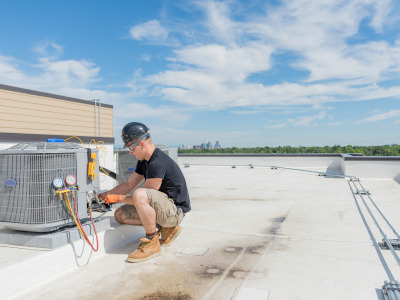DMAK's HVAC Edwardsville IL Experts Take Care of All Your HVAC Needs
DMAK's HVAC Edwardsville IL Experts Take Care of All Your HVAC Needs
Blog Article
How to Pick the Right Heating And Cooling System for Your Home or Office Demands
Choosing the optimal HVAC system for an office or home is no little task. It's a process that calls for mindful examination of individual home heating, cooling, and air flow demands, factor to consider of various system types, and analysis of power effectiveness. With the balance of preliminary costs and long-term savings in mind, this complicated choice demands complete study and expert advice. A wrong choice can result in discomfort, high energy expenses, and frequent upkeep problems. For that reason, recognizing the principles is crucial.
Comprehending the Essentials of HVAC Equipments
A cooling and heating system, an acronym for Home heating, Ventilation, and Air Conditioning, is an important aspect in maintaining a comfortable and healthy and balanced indoor setting. These systems work in unison to manage the indoor temperature level, humidity degrees, and air high quality, allowing residents to change conditions to their taste. The heating component offers warmth throughout cold periods, while the a/c cools the inside throughout warm periods. Ventilation, on the other hand, guarantees a constant exchange of indoor air with fresh outdoor air, getting rid of pollutants and maintaining great air quality. The intricacy of an a/c system can vary, ranging from easy single-room systems to elaborate systems that offer huge business structures. Recognizing these basics is the initial step in selecting the right cooling and heating system.
Reviewing Your Indoor Environment Needs
Moving from a general understanding of a/c systems, the next action entails a mindful assessment of your details interior environment needs. This crucial phase includes assessing your family or office's home heating, cooling, and ventilation needs. It takes into consideration different elements such as the size of your area, insulation degrees, environment, number of passengers, and certain temperature level preferences. A bigger area might demand a much more robust system, while a smaller sized area might not need as much power. Top notch insulation could decrease heating and cooling needs. Areas with extreme temperatures might call for systems with higher effectiveness. One have to also think about the convenience and health and wellness of residents, as poor heating or air conditioning can bring about discomfort or wellness concerns. This comprehensive examination makes sure that your chosen HVAC system will certainly meet your distinct needs.
Discovering Various Kinds of A/c Systems
Navigating via the intricacies of heating and cooling systems can be tough. It is vital to comprehend the series of cooling and heating varieties available, and to make an informed selection based upon price and efficiency contrasts. This expedition will certainly provide a more clear perspective on what each sort of heating and cooling system provides.
Comprehending Heating And Cooling Selections
Ever before questioned the wide variety of choices when it involves HVAC systems? There are basically 4 main types to consider. Central HVAC systems, the most typical, use ductwork to distribute cozy or trendy air throughout your house. Ductless, mini-split systems, on the various other hand, offer temperature level control for individual areas, best for homes with 'locations'. Warm pumps make use of electrical energy to relocate warmth from a cool area to a cozy area, making the cool room cooler and the warm space warmer. Last but not least, packaged heating and air conditioning systems have the blower, heating, and cooling elements done in one device. Each type has its special advantages, and comprehending these can help one make an educated choice.

Cost and Effectiveness Contrast
When discovering the large selection of heating and cooling systems, it is important to consider both cost and effectiveness. At first, more affordable models may show up eye-catching. They are commonly less reliable, resulting in higher power expenses over time. On the other hand, extra expensive systems tend to be a lot more energy-efficient, conserving cash in the long run.
For circumstances, main air systems, though costly, are normally much more effective than window devices. Likewise, warmth pumps are pricey but use heating and cooling capabilities, making them a cost-efficient, year-round solution.
In addition, it is very important to check out the system's Seasonal Energy Efficiency Ratio (SEER) A greater SEER rating suggests far better power performance, which translates to reduced operating expenses (DMAK's HVAC Edwardsville IL Experts). Hence, spending sensibly in a well-chosen cooling and heating system equates to long-term financial savings.
Energy-Efficiency and Your A/c System
The importance of energy-efficiency in HVAC systems can not be overstated. The initial step towards an energy-efficient HVAC system is recognizing the scores and choosing the appropriate versions. This will not only benefit the atmosphere yet also lead to substantial price savings.
Recognizing Energy-Efficiency Ratings
Why is energy-efficiency vital in your cooling and heating system? Due to the fact that it directly affects the functional cost, ecological impact, and general performance, it is important. Energy-efficiency rankings function as an important guide to establish the potential power consumption and savings of an a/c system. This ranking, generally shared in SEER (Seasonal Power Performance Proportion) for a/c unit or AFUE (Annual Fuel Use Efficiency) for heating systems, supplies a clear sign of the system's energy performance. Higher scores imply reduced energy usage, leading to substantial savings on energy bills - DMAK's HVAC visit this site Edwardsville IL Experts. As a result, comprehending these ratings prior to making an acquisition choice is essential. It enables consumers to compare various versions based upon their power performance, bring about notified choices that prefer both their budget and the environment.
Picking Energy-Efficient Designs
How does one set about picking energy-efficient cooling and heating designs? Understanding power scores such as HSPF, eer, and seer is vital. These scores indicate the performance of the system, with higher worths representing better effectiveness. It's likewise vital to think about the dimension of the heating and cooling unit, as larger systems have a tendency to be more energy-efficient. Nonetheless, the system dimension must be proper for the area to avoid power waste. An additional factor to consider is the kind of a/c system. Warmth pumps are generally a lot more energy-efficient than traditional systems. Lastly, look for designs that have energy-saving attributes, such as variable rate motors or programmable thermostats. Making an energy-efficient selection can considerably minimize power intake and ecological influence.
Expense Advantages Analysis

After thinking about the numerous elements that influence the energy efficiency of HVAC systems, it is useful to take a look at the price advantages that feature these selections. An efficient cooling and heating system, although at first more pricey, can conserve considerable amounts in power costs over its life-span. Moreover, it minimizes the environmental effect by using much less energy, supplying an additional layer of benefits. Many governments and energy companies likewise supply rebates or rewards for applying energy-efficient systems, even more decreasing the overall cost. Over time, a high-efficiency heating and cooling system can spend for itself through energy financial savings, while additionally increasing the residential property's worth. When selecting a HVAC system, the cost benefits of energy efficiency must be a vital consideration.
Price Factors To Consider When Selecting a Heating And Cooling System

Installation and Maintenance Aspects of A/c Solutions
Navigating the installation and upkeep of cooling and heating systems can be a complex job. The process typically needs a go to website precise understanding of the system's specifications, which might include ductwork installation, electric circuitry, and ideal placing. Specialists in the field are frequently hired to handle this as a result of the technological skills needed.
Post-installation, the maintenance of these systems is critical to ensure their durability and performance. Routine servicing, consisting of filter adjustments and system checks, is usually recommended. This process involves examination of all elements, cleaning, and adjusting to guarantee the system functions efficiently. Disregarding maintenance can bring about jeopardized performance, greater power consumption, and at some point, system failure. For that reason, comprehending the subtleties of setup and preventive upkeep is crucial when picking a HVAC system.
Conclusion
Finally, selecting the appropriate cooling and heating system needs a comprehensive understanding of the basics, evaluation of interior environment demands, exploration of different system types, and consideration of energy effectiveness and cost. It's important to think about both setup and upkeep facets. By carefully evaluating these factors, one can efficiently pick the cooling and heating system that offers ideal comfort and efficiency in both domestic and industrial atmospheres.
The complexity of an A/c system can differ, ranging from straightforward single-room units to complex systems that serve huge business buildings. DMAK's HVAC Edwardsville IL Experts. Energy-efficiency scores offer as an essential guide to establish the prospective energy consumption and savings of a Heating and cooling system.After taking into account the numerous elements that impact the power performance of A/c systems, it my latest blog post is useful to take a look at the expense benefits that come with these options. When selecting an A/c system, the expense advantages of power performance ought to be a key factor to consider
In conclusion, picking the ideal HVAC system calls for a detailed understanding of the essentials, assessment of interior climate demands, expedition of various system kinds, and consideration of power effectiveness and expense.
Report this page